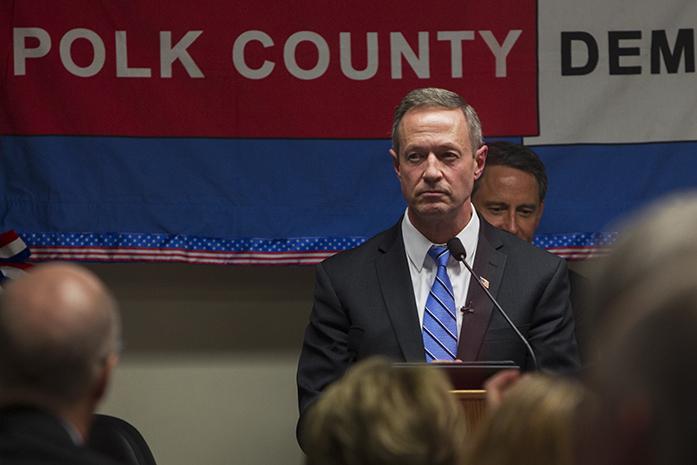Paul Osgerby
[email protected]
I had the pleasure to be one of eight members to represent the Daily Iowan Editorial Board and the Ethics and Politics Initiative during a discussion with Democratic presidential candidate and former Maryland Gov. Martin O’Malley. On the evening of Nov. 7, we discussed the his campaign’s policies, from Iowa’s innovation in clean energy to his campaign’s groundwork in Iowa leading up to the caucuses in February.
O’Malley touted college-education reform, though, focusing more importantly on how that’s also needed in primary and secondary schooling (even pre-primary). To distance himself from Democratic rival Sen. Bernie Sanders, I-Vt., O’Malley outlined plans to not just lower college tuition but reduce administrative costs, which are inflicted by state- and federal-level government shortcomings.
Following the trend for this millennium, college debt is still mounting for students. According to the Institute for College Access & Success, nearly 7 out of 10 students who graduated from a public or nonprofit institution in 2014 were loaded down by loan debt, with a national average of $28,950. Despite frozen tuition at the University of Iowa the past few years, Iowa students rank with the eighth-highest average dollar amount looming, with the lender incessantly knocking: $29,732. The UI holds an average negligibly lower than the average with $28,716 per borrower (mostly reflected in the exorbitant out-of-state rates, I’m sure).
I could go into the gory details of how this debt cripples fresh graduates and their wherewithal, while the very real risk of declaring bankruptcy lurks in the shadows casted by the government. But I’ll spare the specifics (I was never one for slashers).
The former Baltimore mayor admitted with a chuckle to being “probably the most indebted candidate” given his four children have not gone on through university debt-free. However, the anxiety of loans in the future doesn’t contribute to the same sleeplessness that troubles me; with graduation around the corner in December, I’ve relentlessly brooded over job prospects — none more so than those that are pertinent to my degrees.
In regards to education policy, even more so the growing precariouness induced by cost and fees, O’Malley’s campaign has proposed a solution, starting in the formative years: universal prekindergarten and a modification of high school’s fourth year allowing for students to immerse themselves in the college environment through dual credits as well as a “coding for all” strategy to teach students entry-level skills for the information-technology sector.
O’Malley (or, as most my friends said, “Who?”) is certainly a distant third in regards to an already truncated Democratic selection, but I’ll admit to watching my fair share of Air Bud. He’s an amicable candidate, straddling the difference between “the Establishment” and the galvanized reaction in his political party, and by extension the overall candidate landscape.
But if O’Malley’s reformation were indeed to take place, would it enable job placement for me?
Short answer: not really. Long(er) answer: I should’ve learned JavaScript in high school.



